Caudrelier wins Arkea Ultim Challenge
Published on February 27th, 2024
(February 27, 2024; Day 52) – French solo racer Charles Caudrelier, skipper of the Maxi Edmond de Rothschild, crossed the finish line off the coast of Brest this morning at 8h 37mn 42s local time (UTC+1hrs) to win the 2024 Arkea Ultim Challenge-Brest, the first ever solo multihull race around the world, sailed in giant 32m long ULTIM class trimarans.
Caudrelier had been unchallenged at the front of the race since the night of January 17, and before he had to slow to avoid a huge storm at Cape Horn in the Pacific Ocean, was ahead of the time needed to set a new all-time record for sailing solo round the world.
His elapsed time is 50 days 19 hours 07 minutes 47 seconds since the start in Brest amid the six-boat fleet on January 7, 2024. He was the only competitor that did not require a pit stop for repairs.
Caudrelier had was locked into a duel with 26 year old Tom Laperche down the South Atlantic, but then widened the gap to over 2500 miles over Laperche who had to retire into Cape Town with damage caused by a collision.
Along his route, Caudrelier set a new record for the Indian Ocean and then proved he knew how to moderate his pace to look after his high tech flying ULTIM and give himself and the emblematic Gitana team the best chance of completing the 24,260 nautical miles course.
With a substantial lead, Caudrelier put his race on hold – sailing at very slow speeds for more than 36 hours in the eastern Pacific – to avoid a storm at Cape Horn and then sat out storm Louis, stopping in the safety of the Azores to avoid any additional risk which might have jeopardized his win.
This success rewards more than ten years of endeavor by the Edmond de Rothschild Gitana team. They worked initially from 2011 with a MOD70 on which they developed the multihull foiling program before they launched their innovative Verdier designed Ultim in 2017.
Arriving two years later along with co-skipper Franck Cammas, Caudrlier, double winner of The Ocean Race – once as skipper, contributed to the boat’s continued evolution and optimization and the boat built up the most extensive track record of the class with some great victories with Caudrelier including the Brest Atlantique (2019), Fastnet (2019 and 2021), Transat Jacques Vabre (2021), Finistère Atlantique (2022), and blue riband solo Route du Rhum (2022).
After a frustrating Transat Jacques Vabre last autumn which was marked by numerous damages, including problems with the steering system and a foil, finishing in third place, the Gitana team worked hard to repair to be ready for this race and to move forward.
“I’ve had my struggles but I know that things are turning round,” said Caudrelier before the start of the Arkea Ultim Challenge-Brest.
From the early days on this race, he had to deal with small problems including a break in his forward fairing. Although he succeeded in capturing a dream ride on a low pressure from the South Atlantic until the south of Australia, the second half of his race was much more problematic, including his pause before Cape Horn and his strategic halt into the Azores last week.
A popular, highly respected racer and leader among his peers, this is Caudrelier’s biggest solo success and finally fulfills his youthful dreams of winning a singlehanded race around the world. Added to his wins in The Ocean Race, he further establishes himself as one of the best skippers among the French greats.
Charles Caudrelier’s victory in figures:
Finish time: 8 h 37 min 42 sec
Race time: 50 days 19 hours 7 min 42 sec
Miles traveled: 28,938,03 miles
Actual average speed: 23.74 knots
Average speed on the great circle: 19.93 knots
Details: https://arkeaultimchallengebrest.com/en
The Arkea Ultim Challenge-Brest is a solo, non-stop round-the-world race for Ultim Class trimarans which have a maximum length of 32 meters and a maximum width of 23 meters.
The solo speed record around the world was set in 2017 by François Gabart (FRA) on the 30m Macif trimaran in a time of 42d 14h 40m 15s for an average speed of 21.08 knots. This yacht has been rebranded and will be raced by Marchand.
Entrants:
• Charles Caudrelier (FRA), Maxi Edmond de Rothschild (2017 Verdier 32/23)
• Thomas Coville (FRA), Sodebo Ultim 3 (2019 VPLP/others 32/23)
• Tom Laperche (FRA), Trimaran SVR-Lazartigue (2021 VPLP 32/23)
• Armel Le Cléac’h (FRA), Maxi Banque Populaire XI (2021 VPLP 32/23)
• Anthony Marchand (FRA), Actual Ultim 3 (2015 VPLP 30/22)
• Éric Péron (FRA), Trimaran Adagio (2014 VPLP 31/21)*
* Only entrant without foiling appendages
Attrition:
January 29: Tom Laperche on Trimaran SVR-Lazartigue and his team realized they don’t have the facilities or the means to complete the complex, difficult repair needed, and they have no option but to retire and get their boat back to Concarneau. Laperche incurred damage on January 18 when his daggerboard in the main hull collided with an UFO (unidentified floating object). He had arrived in Cape Town on January 22 in hopes to repair the damage.
Five rules from the Sailing Instructions:
• The start is January 7 from Brest, France. The start line is kept open for 168 hours and the finish line is closed after an elapsed time of 100 days after the start time, that is to say April 16, 2024.
• The skippers can communicate and exchange with their teams on shore, so they have the freedom to get weather information and be routed by their team on shore and get technical help and advice to help with technical problems.
• The solo skippers can stop but there are two distinct operations. A technical stop is unassisted and requires the sailor to drop anchor, take a mooring, or tie up alongside an anchored or moored boat with no external help. There is no time penalty for a technical stop. But for a technical stopover (escale technique) where one or more crew or technical team come on board to help, there is a mandatory 24 hours minimum. This does not apply to the start port of Brest where all means are authorized to reach or leave the port within a radius of 50 miles.
• For the first time in ocean racing, zones where there are known to be a high concentration of whales and sea mammals are determined. Establishing these zones should both protect the marine wildlife and reduce the chance of a collision. These zones are around the Azores, the Canaries, south of South Africa, the Kerguelens, and parts of the Antarctic.
• There are ice exclusion zones to protect the skippers and their boats.
Source: AUCB


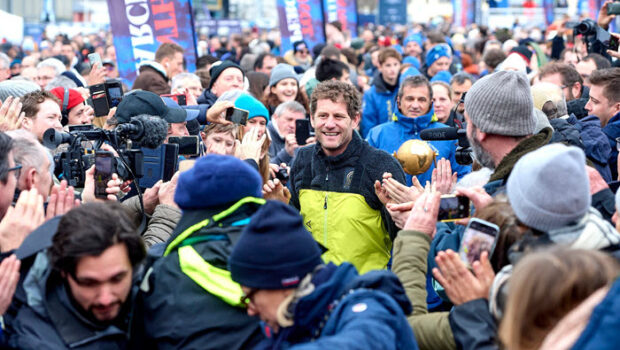

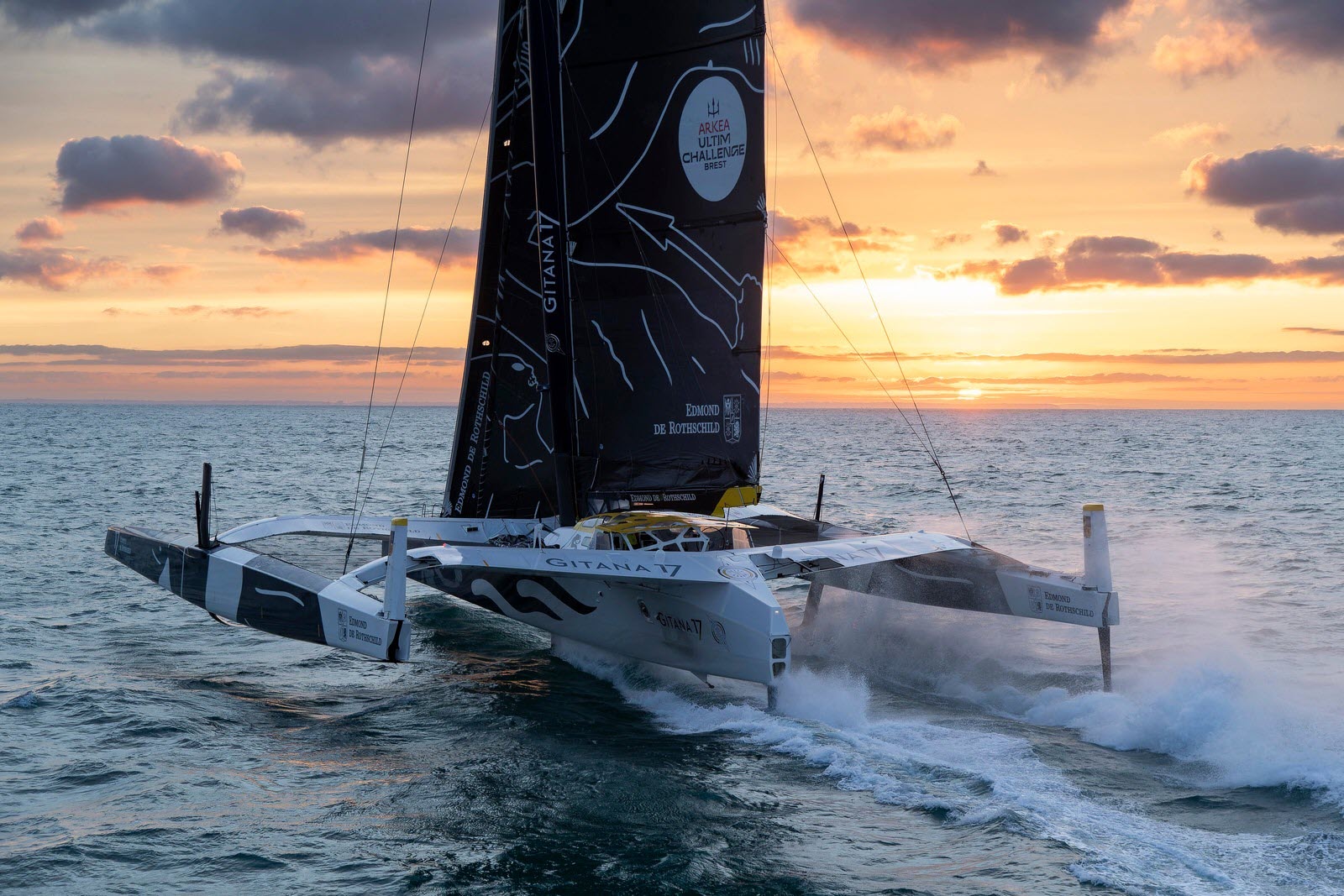

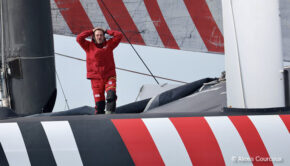
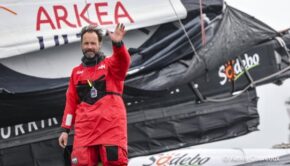
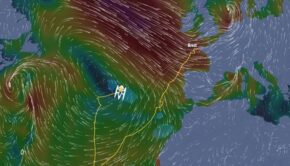
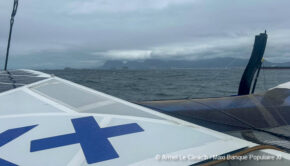
 We’ll keep your information safe.
We’ll keep your information safe.